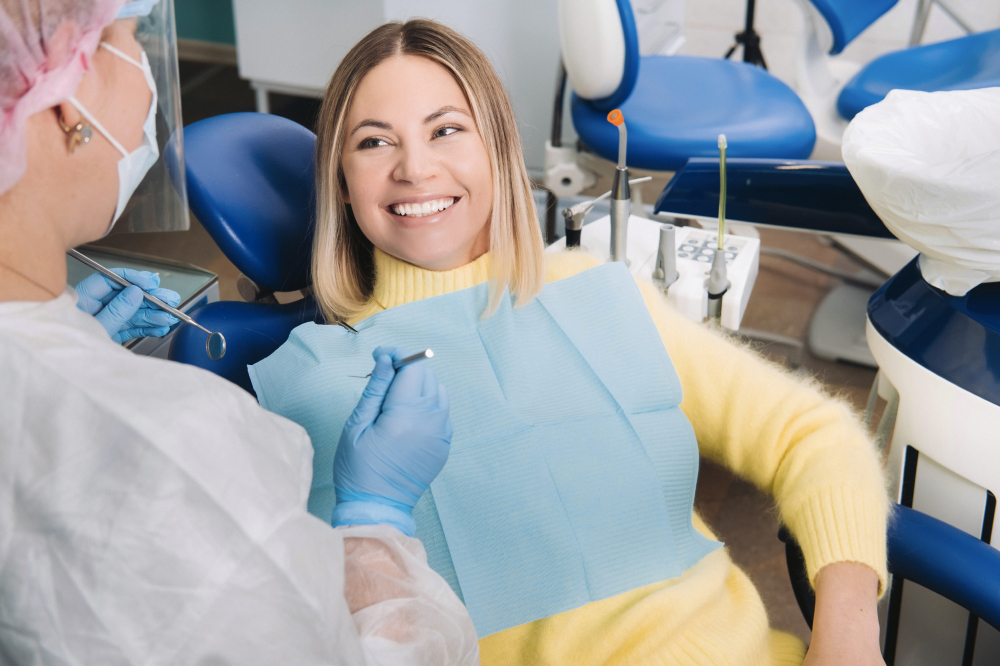How to Choose a Dentist for Cavity Treatment
22 Jul 2024
Choosing the right dentist is very important for your dental health. At Greenspoint Dental, we make sure every patient gets the best care in a friendly and helpful way. Whether you need help with a toothache, want to know more about fixing cavities, or just need a regular dental check-up, we are here to support you.
In this blog, we will cover:
Signs You Need a Cavity Dentist: Learn how to spot the early signs that you should see a dentist.
How to Choose the Right Dentist: What to look for to find the best dentist for your needs.
Dental Clinic Equipment and Comfort: Why good tools and a nice clinic are important.
Why Dentist Location Matters: How having a dentist nearby helps.
Reading Dentist Reviews: How other people’s opinions can help you choose a dentist.
Questions to Ask Your Dentist: Important things to ask on your first visit.
Choosing a Local Dentist: The benefits of having your dentist close to home.
Flexible Scheduling: Why it’s good when dentists are available when you need them.
New Patient Special at Greenspoint Dental: A special deal for new patients.
Join us to find out how Greenspoint Dental can be the right dental partner for you.
Signs You Need to see a Dentist for a Cavity?
Recognizing when to seek help from a cavity dentist is key to preventing minor dental issues from escalating into major problems. Here are specific symptoms that indicate it’s time to consult a specialist:
- Sensitivity to Temperature: If your teeth hurt after eating hot soup or drinking iced beverages, it’s a sign that your enamel might be weakened, and a cavity could be forming.
- Visible Holes or Pits: Obvious signs of cavities are small holes or pits in your teeth. These spots are where decay has eroded the enamel.
- Pain When Chewing: Experiencing pain during chewing is a clear indication that decay might have reached the deeper layers of a tooth, affecting the nerves.
- Spontaneous Toothache: Random or sudden pain in your teeth can indicate that decay has spread, requiring immediate dental attention.
- Discoloration: Dark spots or white streaks on your teeth can be early signs of mineral loss and potential cavities.
- Swollen Gums: If the gums around your teeth are swollen or bleed easily, it might be a reaction to cavities or deeper infection.
- Bad Breath or Taste: Persistent bad breath or a bad taste in your mouth can be caused by lingering bacteria and decayed food particles in cavities.
Prompt attention to these signs can save not only your teeth but also reduce the need for more extensive and expensive treatments later. Regular check-ups can catch these symptoms early, making treatment easier and less costly.
How to Evaluate a Dentist’s Expertise in Cavity Treatment?
Choosing the right dentist is important for good cavity care. Here’s how to make sure they’re qualified:
- Educational Background: Look for their diploma in their office or on their website. It’s a good sign if they studied at a school recognized by major dental associations.
- Experience with Cavities: Ask them or check online to see how often they treat cavities. More experience usually means better care.
- Modern Technology: See if they use new tools like digital X-rays or lasers. These help them do a better job and make the treatment easier for you.
- Treatment Options: A great dentist will clearly explain different ways to fix a cavity and help you understand the benefits and risks of each.
- Patient Education: Notice how the dentist talks about your teeth and treatment. They should make things easy to understand, using plain language and maybe pictures or models.
- Reviews and Testimonials: Read what other patients have said about their experiences, especially regarding cavity treatments. Good reviews often mean a trustworthy dentist.
Using these steps, you can find a dentist who not only knows their stuff but also cares about explaining things clearly and providing comfortable treatments.
What Should You Look for in a Dental Clinic’s Facilities and Technology?
The right equipment and setup in a dental clinic can greatly impact the quality of your treatment. Here’s what makes a difference:
- Modern Equipment: Ensure the clinic uses the latest tools, like digital X-rays and dental lasers, which make treatments quicker, less painful, and more accurate.
- Clean and Organized Space: A well-kept clinic indicates a commitment to hygiene and patient safety. Everything should appear orderly and professional.
- Comfort Features: Good clinics provide features to enhance comfort, such as TVs, music, or sedation options for those who feel anxious.
- Accessibility Features: The clinic should be accessible to everyone, with ramps, elevators, and suitable bathrooms for those with special needs.
- Intraoral Cameras: These small, pen-like devices let dentists see detailed images of your mouth instantly. They help in explaining what’s happening and make examinations more precise.
- CAD/CAM Technology: This technology allows dentists to quickly make crowns, inlays, or onlays right in the office, often in just one visit. It saves time and can be more comfortable for you.
- Electric Handpieces: These tools are quieter and more accurate than older ones, making the treatment experience better and preserving more of your healthy tooth.
- Teledentistry: This service lets you consult with your dentist remotely, which is great for follow-up visits or initial assessments before you even come to the clinic.
While new technologies often mean better care, they can be expensive and quickly outdated. Some clinics might use older equipment, not because they can’t afford new ones but because it still delivers good results. This might mean they choose to spend more on other areas like patient service or lower costs. However, if a clinic isn’t keeping up with important updates, it might miss out on advancements that could improve care.
Choosing a clinic that balances modern technology with thoughtful patient care shows they are committed to providing the best possible treatment.

How Can Location Influence Your Choice of Dentist?
The location of your dentist is more important than you might think. Here’s why choosing a nearby dentist can be beneficial:
- Ease of Access: A dentist close to your home or workplace makes it easier to attend regular appointments. You’re more likely to keep up with your dental care if it’s convenient.
- Emergency Access: If you have a dental emergency, a nearby dentist can see you much faster. This can be crucial when you need urgent care.
- Local Knowledge: Dentists in your area are more likely to understand local health issues and environmental factors that might affect your dental health.
- Community Connection: A local dentist may be more invested in the community’s well-being and known among your neighbors. This can give you extra peace of mind.
- Maintaining Relationships: Once people find a dentist they trust, they often travel further to keep seeing them. A strong relationship with your dentist, built on trust and positive experiences, is worth the extra travel time for many.
Choosing a dentist who is easy to reach and well-connected in your community doesn’t just save you time. It could also lead to better and more personalized care.
Why Is Patient Feedback Important When Choosing a Dentist?
Patient feedback is a crucial tool when you’re deciding on a dentist. Here’s why it matters:
- Real Experiences: Reviews often reflect genuine patient experiences, offering insight into how the dentist handles everything from routine care to emergencies. This can give you a realistic expectation of what to expect.
- Quality of Care: Positive feedback usually points to high-quality care. If many reviewers mention the gentleness, effectiveness, or thoroughness of a dentist, it’s likely you’ll experience the same.
- Patient Satisfaction: Reviews can tell you not just about the dental treatment, but also about the overall patient experience, including ease of scheduling, office environment, and staff behavior.
- Red Flags: On the flip side, consistent negative reviews can alert you to potential problems. Complaints about cleanliness, wait times, or billing practices can be major deterrents.
- Trustworthiness: A dentist with many positive reviews is often seen as more trustworthy. People tend to trust a dentist more if others have had good experiences.
Using patient feedback helps you choose a dentist based on the experiences of others, rather than just marketing or first impressions. It’s a valuable way to gauge how satisfied you might be with your dental care.
To find reliable reviews of dentists, potential patients can consult several key resources:
- Google Reviews: A primary source for many people, where you can see star ratings and detailed patient feedback on local dental practices.
- Yelp: This platform provides user reviews and ratings specifically for local businesses, including dental clinics.
- Healthgrades: Focused on healthcare providers, Healthgrades offers reviews and ratings along with detailed information about practitioners’ backgrounds and specialties.
- Zocdoc: Here, patients can not only find reviews but also book appointments directly. Zocdoc provides a seamless interface for reading patient feedback and assessing a dentist’s availability.
- Facebook: Many practices maintain active Facebook pages where patients leave comments and share their experiences. Social media platforms offer a more interactive insight into the practice’s community involvement and patient care approach.
What Questions Should You Ask During Your First Visit?
Visiting a new dentist is a great chance to see if they’re the right fit for you. While it might feel daunting to ask direct questions, you can still gather a lot of information in subtle ways. Here’s how to do it:
- Experience and Specialization:
- Listen for clues: During your consultation, listen to how the dentist describes their experience with cavity treatments. Do they mention advanced techniques or specialized training?
- Look around: Check for diplomas or certificates on the walls that show their education and ongoing training.
- Materials Used for Treatments:
- Ask indirectly: You can ask about the materials used in treatments in the context of discussing your treatment options. For instance, “What kind of fillings do you generally use, and why?”
- Pain Management Techniques:
- Observe available information: Look for brochures or posters in the clinic that talk about pain management. This can give you an idea of how they handle patient comfort.
- Inquire casually: You could ask the staff how patients typically find their treatment experiences in terms of comfort.
- Communication Style:
- Notice interactions: Pay attention to how the dentist explains procedures during your visit. Are they clear and easy to understand?
- Check communication materials: See if there are informative displays or educational materials that help patients understand their dental health.
- Bedside Manner:
- Observe their interactions: Watch how the dentist and staff interact with you and other patients. Are they patient and attentive?
- Review feedback: Before your visit, look at online reviews to see what others say about the dentist’s approach to patient care.
These approaches allow you to assess the dentist’s qualifications and style without having to ask direct questions, making your decision easier and less stressful.
Why Choose a Dentist with Flexible Scheduling?
Choosing a dentist isn’t just about finding someone skilled. It’s also important to find someone who fits into your busy life. Here’s why flexible scheduling matters:
- Busy Lives Need Flexible Hours: If you have a busy schedule, look for a dentist who offers evening or weekend appointments. This makes it easier to get the care you need without changing your daily plans.
- Quick Help When You Need It: Emergencies can happen without warning. It’s crucial to have a dentist who can see you right away when you need urgent care.
Here are easy ways to find out if a dentist can accommodate your schedule:
- Look at Appointment Times: Start by checking the dentist’s website or calling their office. See how long it takes to get a regular check-up or an emergency appointment.
- Office Hours: Check if the dentist has office hours early in the morning, late in the evening, or on weekends. This shows they try to make visits easy for everyone.
- Handling Emergencies:Find out how the dentist deals with emergencies. Good practices are ready to help quickly.
- Online Booking: An online booking system shows the dentist values your time. It makes scheduling easy and shows they keep up with technology.

Why Should You Pick a Local Dentist for Ongoing Dental Care?
Choosing a local dentist is great for your long-term dental health. Here’s why it’s a smart choice:
- Easy Ongoing Care: A dentist nearby knows your dental history well. This helps them keep detailed health records and watch for any changes over time. They can spot problems early and adjust your care as needed.
- Builds Trust: Seeing the same dentist regularly helps build a trusting relationship. This trust makes it easier to stick with regular check-ups and get quick help for new problems.
- Convenience and Personalized Care: Going to a local dentist makes your visits easier. It also means you get care that’s tailored just for you. Choosing someone close to home isn’t just about convenience; it’s a choice that keeps you healthier in the long run.
Greenspoint Dental’s New Patient Offer: Start Your Journey to Great Dental Health
Greenspoint Dental makes high-quality care easy to get. With the New Patient Special for just $99, you get complete X-rays, a regular cleaning, and a cancer screening. This special deal helps new patients get excellent care at an affordable price. It’s a great chance for you to try out top-level dental services and join a community that cares deeply about dental health.
Choose Wisely for Your Dental Health
Finding the right dentist is key to getting good care for your teeth and keeping them healthy over the long term. Greenspoint Dental has the expertise, modern facilities, and a caring approach to make sure you get the best dental treatment. With their New Patient Special, they invite you to see how much they care about your comfort and health. Joining Greenspoint Dental means being part of a community that’s all about great oral health.

Take Action for Your Dental Health
Are you ready to improve your dental health? Book your appointment with Greenspoint Dental now. With the New Patient Special, you can become part of a community that puts your smile first. See the difference at Greenspoint Dental, where we focus on your health first and foremost.
Related Blog Articles